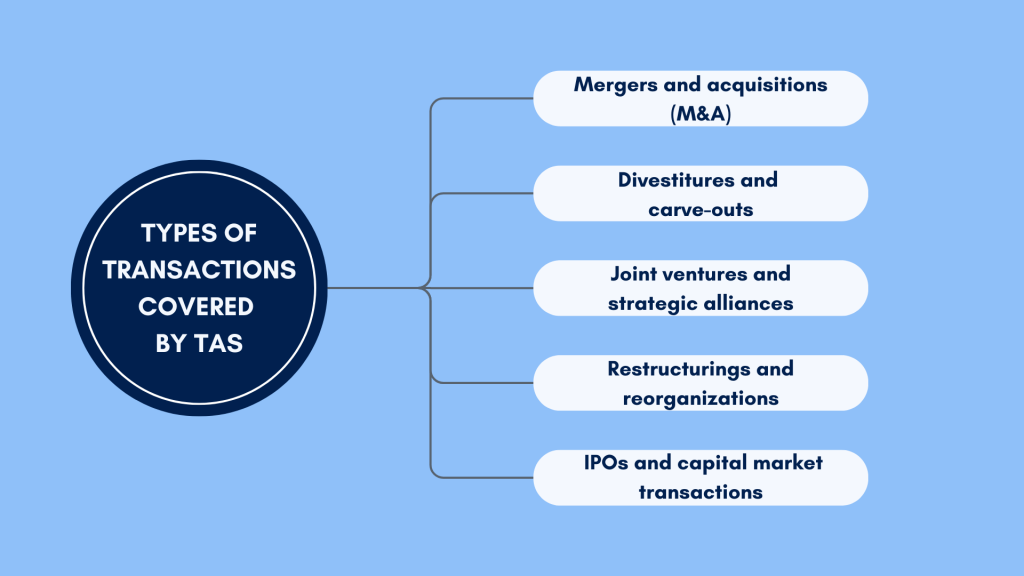As a business, you might need to undertake complex transactions such as mergers, acquisitions, divestitures, joint ventures, or restructurings. These deals can have significant financial and operational implications, and you might need specialized expertise to handle them successfully. The thing is, if you fail, you might face substantial risks and potential value erosion.
Transaction advisory services provide businesses with the necessary support and guidance throughout the transaction lifecycle. Let’s look at them in more detail.
Key takeaways
- Engaging transaction advisory services is essential for navigating complex transactions successfully.
- Transaction advisory firms offer a comprehensive range of services, including M&A advisory, due diligence, valuation, and integration support.
- Selecting the right transaction advisory firm with the appropriate expertise, resources, and cultural fit is crucial for a successful transaction outcome.
Level up your accounting with smart automation! Integrate financial data from all your sales channels in your accounting to have always accurate records ready for reporting, analysis, and taxation. See it in action with a 15-day free trial or spare a spot at our weekly public demo to have your questions answered.
What is transaction advisory service (TAS)?
Transaction Advisory Services (TAS) is a range of specialized consulting services provided by professional firms to assist businesses and organizations in navigating complex transactions, such as mergers and acquisitions (M&A), divestitures, joint ventures, and restructurings.
What is the scope of TAS?
Transaction advisory services encompass a wide array of activities, including financial due diligence, valuation analysis, deal structuring, tax advisory, and post-merger integration support.
These services are designed to provide clients with expert guidance and support throughout the entire transaction lifecycle, from strategic planning and execution to post-transaction integration.
Different types of transactions covered by TAS
Transaction advisory services can apply to various types of transactions, each with its unique complexities and requirements.
Let’s explore these different types of transactions in more detail.

#1 – Mergers and acquisitions (M&A)
M&A transactions involve the combination of two or more companies or the acquisition of one company by another. Transaction advisory services play a crucial role in supporting M&A activities and M&A advisory, such as:
- Target identification and screening,
- Valuation analysis and financial modeling,
- Due diligence (financial, operational, legal, and regulatory),
- Deal structuring and negotiation support,
- Integration planning and post-merger integration assistance.
For example, if Company A is acquiring Company B, transaction advisors would conduct extensive due diligence on Company B’s financials, operations, legal compliance, and potential risks. They would also assist in valuation analyses, negotiating the purchase price, and developing integration strategies to realize synergies.
#2 – Divestitures and carve-outs
Divestitures involve a company selling or divesting a business unit, subsidiary, or product line. Carve-outs are a type of divestiture where a specific business unit or division is separated from the parent company to become a standalone entity. Here’s what transaction advisory services can help with.
- Preparing the carve-out entity for separation (financial statements, legal restructuring, etc.),
- Conducting due diligence on the divested assets or business unit,
- Valuation and pricing analyses,
- Identifying potential buyers or investors,
- Negotiating and structuring the transaction.
For instance, if Company X decides to divest its non-core business unit, transaction advisors would help prepare the financial and operational separation, conduct due diligence, value the business unit, and facilitate the sale process.
#3 – Joint ventures and strategic alliances
Joint ventures and strategic alliances involve the collaboration or partnership between two or more companies to pursue a specific business opportunity or objective. Here’s why you might need transaction advisory services in this context.
- Conducting due diligence on potential partners,
- Structuring and negotiating the joint venture or alliance agreement,
- Valuation and financial modeling for the joint venture entity,
- Advising on governance and operational structures,
- Guiding regulatory and legal compliance.
Let’s say, Company A and Company B form a joint venture to develop a new product. Transaction advisors would assist in structuring the joint venture, conducting due diligence on both parties, and advising on the governance and operational aspects of the partnership.
#4 – Restructurings and reorganizations
Restructuring and reorganizations involve significant changes to a company’s financial or operational structure. Transaction advisory services can support these transactions by:
- Conducting financial and operational due diligence,
- Developing restructuring plans and strategies,
- Advising on debt restructuring, asset sales, or business rationalization,
- Assisting with bankruptcy or insolvency proceedings (if applicable),
- Guiding legal and regulatory compliance.
For instance, if a company faces financial distress and needs to restructure its debt or operations, transaction advisors would analyze their financial situation, develop restructuring plans, and guide the company through the process while ensuring compliance with relevant regulations.
#5 – Initial public offerings (IPOs) and capital market transactions
Initial public offerings (IPOs) involve taking a private company public by issuing shares on a stock exchange. Transaction advisory services can support IPOs and other capital market transactions by:
- Conducting due diligence on the company’s financials and operations,
- Assisting with financial reporting and compliance requirements,
- Valuation analyses and pricing of the offering,
- Advising on regulatory and legal requirements
- Supporting the marketing and investor relations efforts.
Imagine a company planning to go public through an IPO. Transaction advisors would conduct due diligence, do comprehensive financial reporting and valuation, and assist the company through the IPO process, ensuring compliance with securities regulations.
So, you can see where transaction advisory services can provide valuable support and expertise. The specific services by transaction advisors may vary depending on the nature and complexity of the transaction, as well as the client’s particular needs and the industry they operate.
How do TAS differ from other consulting services?
Transaction advisory services differ from other consulting services in several ways.
First, they are highly specialized and focused on complex transactions, requiring in-depth knowledge of financial analysis, valuation techniques, and industry-specific expertise.
Plus, transaction advisory services are typically time-sensitive, as transactions often have strict deadlines and require prompt decision-making. Furthermore, these services involve a multidisciplinary approach, combining expertise from various areas such as finance, accounting, tax, and legal.
Why do businesses need transaction consulting?
Businesses, ranging from small enterprises to multinational corporations, frequently engage in various types of transactions including mergers, acquisitions, joint ventures, and divestitures. The motivations for these transactions are diverse, with common strategic reasons being the desire to expand market presence, acquire new technologies or capabilities, diversify product lines, or realign the business portfolio to focus on core competencies.
- Market expansion often involves entering new geographic territories or consumer segments, offering a pathway to increased revenues and a broader customer base.
- Acquiring new technologies or capabilities, on the other hand, can provide a competitive edge, allowing a company to innovate or improve its operational efficiency.
- Diversification of product lines helps in spreading risks across different markets and can tap into new revenue streams. Realignment, such as shedding non-core business units, helps a company focus its resources and management attention on its primary areas of strength and competitive advantage.
However, these transactions are fraught with complexities and challenges. They involve detailed due diligence, valuation of assets, negotiation of terms, integration planning, and often regulatory approvals. There are significant risks including cultural mismatches, overvaluation of assets, failure to realize synergies, and disruption to the existing business.
Given these complexities and risks, transaction consulting has become a critical component of the strategic transaction process.
What are the benefits of engaging TAS?
Engaging transaction advisory services can provide businesses with numerous benefits, including:
#1 – Expert guidance and support throughout the transaction lifecycle
Expert guidance and support throughout a transaction lifecycle are invaluable for businesses. It includes assistance from the initial stages of identifying potential transaction opportunities through due diligence, negotiations and finalizing the deal.
Experts provide critical insights and guidance at each stage, helping businesses navigate complex legal, financial, and operational aspects. Their experience ensures they can handle various transaction-related challenges, leading to more informed and strategic decision-making.
#2 – Objective and independent advice, free from conflicts of interest
Receiving objective and independent advice is crucial in business transactions. This advice is free from conflicts of interest, meaning the guidance provided is solely for the benefit of the business undertaking the transaction.
Independent consultants or advisors do not have vested interests in the deal’s outcome, which ensures their advice is unbiased. This objectivity helps businesses evaluate opportunities and risks more accurately, leading to decisions in their best interest.
#3 – Access to specialized knowledge and industry-specific expertise
Access to specialized knowledge and industry-specific expertise is a significant advantage for businesses engaging in transactions. Consultants or advisors with specific industry knowledge bring insights about market trends, competitive landscapes, regulatory environments, and technology advancements.
This expertise enables businesses to understand the intricacies of their industry better and how a potential transaction aligns with industry dynamics, ensuring more strategic and informed decision-making.
#4 – Identification and mitigation of potential risks and challenges
Identifying and mitigating potential risks and challenges is a key aspect of transaction consulting. Advisors assess financial, operational, legal, and reputational risks associated with a transaction. They help formulate strategies to mitigate these risks, such as developing contingency plans or negotiating better deal terms. This risk management ensures businesses are better prepared for potential challenges, safeguarding their interests.
#5 – Improved decision-making through comprehensive financial and operational analysis
Comprehensive financial and operational analysis provided by experts can facilitate decision-making. This analysis involves a deep dive into the financial health and operational efficiency of the entities involved in the transaction.
It helps in understanding the true value of the transaction, potential cost savings, and revenue opportunities. This thorough analysis aids businesses in making well-informed decisions that are financially and operationally sound.
#6 – Facilitation of smoother integration processes and realization of synergies
After completing a transaction, the focus shifts to integrating the entities involved. It implies merging operations, cultures, and systems.
Expert advisors help plan and execute integration strategies effectively, ensuring a smooth transition. They also assist in identifying and realizing synergies, such as cost savings or revenue enhancements, that arise from the combination of businesses, thereby contributing to the overall success of the transaction.
Common transactions risks transaction consulting helps mitigate
Transaction consulting plays a crucial role in mitigating various common risks associated with business transactions. These risks, if not properly managed, can significantly impact the success and value of a deal. Here are some of the key transaction risks that transaction consulting helps mitigate:
- Financial risks
One of the most significant risks involves financial aspects such as incorrect valuation of the target company, unexpected costs, or unforeseen liabilities. - Operational risks
These risks include challenges in integrating the operations of two companies, disruptions to the current business operations, and issues in scaling operations post-transaction. - Strategic risks
This involves the risk of the transaction not aligning with the company’s overall strategic objectives, or the market evolving differently than expected post-transaction. - Regulatory and compliance risks
Transactions, especially in certain industries or cross-border deals, can face significant regulatory hurdles and compliance issues. - Cultural and HR risks
The risk of cultural mismatches between the merging organizations can lead to conflicts, employee dissatisfaction, or high turnover. - Reputation risks
Transactions can affect the reputation of the companies involved. Missteps in the transaction process or failure to meet stakeholder expectations can lead to negative publicity. - Market and economic risks
Fluctuations in market conditions or economic downturns can impact the success of a transaction. - Technology risks
In deals involving technology transfer or integration, there are risks related to incompatibility, intellectual property issues, or cyber security.
How can a transactions advisor help mitigate these risks?
A transaction advisor brings expertise and guidance to the table, being instrumental in mitigating risks and beating the complexities of a deal.
Let’s break it down.
Mitigating financial risks
Transaction advisors conduct thorough financial due diligence, which includes scrutinizing the target company’s financial statements, assessing liabilities, and evaluating future cash flow projections. This detailed analysis helps in accurately valuing the company and identifying any hidden financial risks, ensuring that the transaction is financially sound.
Addressing operational risks
Advisors assist in assessing the operational fit of the companies involved. They evaluate systems, processes, and operational structures to identify potential integration challenges. They also provide recommendations for integrating operations smoothly and minimizing disruptions to ongoing business activities.
Strategic risk management
Transaction advisors work closely with the company’s leadership to ensure that the transaction aligns with the overall strategic goals. They analyze market trends, competitive landscapes, and the strategic rationale behind the transaction, advising on whether the deal will contribute to long-term strategic objectives.
Navigating regulatory and compliance risks
Advisors have expertise in transaction legal and regulatory aspects, especially in cross-border deals. They help understand and comply with regulatory requirements, obtain necessary approvals, and ensure adherence to legal standards, thus avoiding potential legal and financial penalties.
Cultural and HR integration
Advisors conduct cultural due diligence, helping companies understand the cultural differences between the entities involved. They advise on strategies for cultural integration, communication, and HR management to ensure a smooth blending of workforces and minimize cultural clashes.
Reputation risk management
Transaction advisors assist in developing a communication strategy for stakeholders, including employees, customers, and investors. Effective communication helps maintain a positive perception of the transaction, safeguarding the involved parties’ reputation.
Market and economic risks assessment
Advisors provide insights into market conditions and economic trends that could impact the transaction. They help in scenario planning and risk assessment, allowing companies to prepare for and adapt to changing market dynamics.
Technology risk mitigation
When transactions involve significant technology components, advisors assess technology compatibility, intellectual property concerns, and cybersecurity risks. They guide technology integration, ensuring a seamless transition and protection of critical digital assets.
How can TAS assist with purchase price allocation?
Back to acquisition, purchase price allocation (PPA) can be particularly complex. So, it’s worth looking at it in more detail, as it significantly impacts financial reporting and strategy formation.
The primary objective of PPA is to distribute the overall purchase price among the acquired assets and liabilities. This allocation is not arbitrary but based on the fair market values of these assets and liabilities at the time of acquisition.
For example, Company A acquires Company B for $100 million. It needs to know what assets and liabilities Company B has.
Assets include things like property, patents, and customers. Liabilities include loans and accounts payable.
Using purchase price allocation (PPA), each asset and liability is assigned a portion of the $100 million based on its market value.
Also, if Company B’s property is worth $40 million, that amount is assigned to the property asset in Company A’s balance sheet.
This allocation is vital for a few reasons:
- Compliance with accounting standards
PPA is a requirement under accounting standards such as the International Financial Reporting Standards (IFRS) and Generally Accepted Accounting Principles (GAAP) in the United States. These standards mandate that the assets and liabilities of the acquired company must be reported at their fair value in the acquiring company’s financial statements. - Accurate reflection of asset value
PPA allows for the accurate reflection of the value of the acquired assets and liabilities on the balance sheet. This precision is crucial not just for regulatory compliance but also for investors and stakeholders who rely on financial statements to assess the health and value of a company. - Strategic implications
The allocation of the purchase price can have significant tax and strategic implications. For example, tangible assets like machinery depreciate over time, while intangible assets like brand names or patents might amortize. The way of valuing or depreciating (or amortizing) these assets can affect future earnings and tax liabilities.
Transaction advisory firms play a critical role in PPA by valuing diverse assets and liabilities using various methods and ensuring compliance with accounting standards. It helps reflect a true and fair view of the acquisition on the balance sheet and assists in strategic decision-making post-acquisition.
The role of transaction advisory in due diligence processes
Due diligence means carefully checking all the details of a business or investment before deciding to proceed with the deal. It involves looking into the company’s finances, legal issues, and anything else that could affect the decision.
The aim is to understand the risks and benefits clearly, helping to make the right choice and avoid unexpected problems later.
How can TAS streamline due diligence processes?
Transaction advisory firms can streamline due diligence processes by leveraging their expertise and resources.
They typically employ efficient methodologies, tools, and databases to gather and analyze relevant information. Additionally, their industry-specific knowledge and experience enable them to focus on the most critical areas and identify potential red flags or opportunities more effectively.
What are the key areas covered by TAS during due diligence?
During due diligence, transaction advisory firms typically cover the following key areas:
- Financial due diligence
Analyzing financial statements, accounting policies, and financial projections; - Operational due diligence
Assessing operational processes, supply chain, IT systems, and management capabilities; - Legal and regulatory due diligence
Reviewing contracts, intellectual property rights, and compliance with laws and regulations; - Tax due diligence
Evaluating tax implications, structuring, and potential exposures; - Commercial due diligence
Analyzing market dynamics, competitive landscape, and growth opportunities.
How to choose the right transaction advisory firm?
Selecting the transaction advisory firm that would cater to your peculiar needs is crucial for ensuring a successful transaction outcome.
Businesses might want to consider several factors when making this decision.
Factors to consider when selecting a transaction advisory firm
- Industry expertise and experience in similar transactions
- Reputation and track record of success
- Access to specialized resources and subject matter experts
- Global reach and capabilities (for cross-border transactions)
- Cultural fit and alignment with the client’s values and goals
- Fee structure and cost-effectiveness
What expertise and experience should transaction advisors possess?
Ideally, transaction advisors should possess a combination of technical expertise and practical experience.
They should have strong financial and analytical skills and in-depth knowledge of relevant accounting standards, tax laws, and regulatory requirements.
Additionally, advisors should have experience executing similar transactions within the client’s industry or sector, allowing them to provide industry-specific insights and best practices.
How can businesses evaluate the quality of TAS?
Businesses can evaluate the quality of transaction advisory services by reviewing the firm’s track record, client references, and case studies. They should also assess the qualifications and experience of the advisory team assigned to their transaction. Additionally, businesses can request presentations or proposals from multiple firms to compare their approaches, methodologies, and value propositions.
Bottom lilne
To make a long story short, transaction advisory can help handle complicated business deals well. These firms provide many services, like helping with acquisitions, checking financial details, figuring out value, and helping businesses merge smoothly. It’s critical, though, to choose the right advisory firm. It should have the right skills and resources and, which is no less important, work well with your company’s culture. The right choice can lead to a successful deal, make the whole process smoother and help your business goals.
Continue reading: What’s the best accounting software for non-profits?
Share your thoughts
Have you ever needed transaction advasory? Share your thoughts and experience with TAS in the comments section below! We’d love to hear from you.







Keep up the great work! Thank you so much for sharing a great posts.